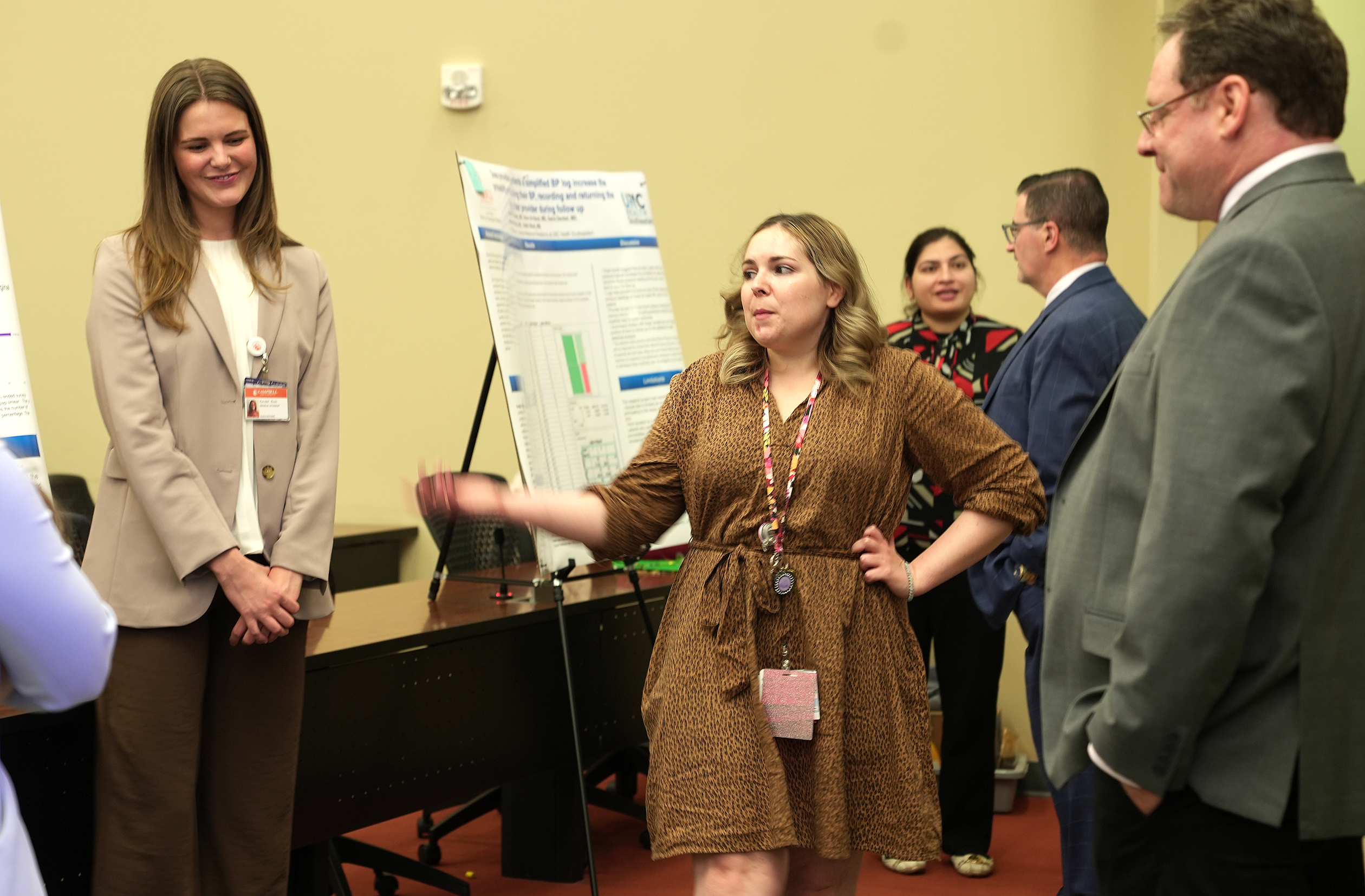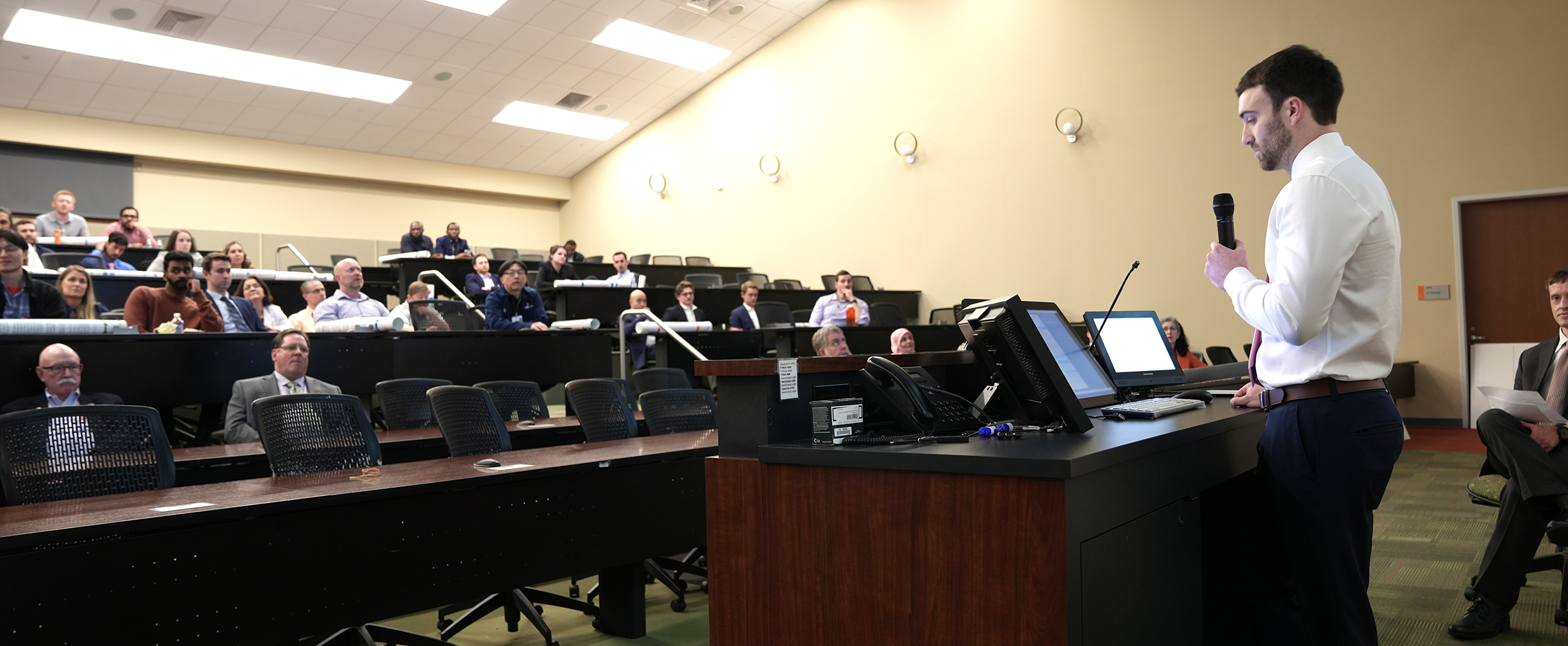From the proper treatment of a child who eats mothballs to the outcomes of sleep medications prescribed to senior patients, the research presented to the sixth annual Campbell University Resident Research and Education Symposium ran the gamut of challenges faced by the more than 158 resident doctors in the School of Osteopathic Medicine’s program.
The largest regional resident research competition that Campbell University has ever sponsored featured nearly 300 total residents, faculty members and fellows. Projects were categorized to focus on seven CMS-recognized health care quality improvement areas — mortality, re-admissions, safety of care, patient experience, effectiveness of care, timeliness of care, efficient use of medical imaging and testing, emerging medical care and diagnosis and academic medicine.
“This is an incredibly important component of education in training our future physicians to practice medicine as physician scientists who are looking for new ways of treating their patients and improving care in their communities,” said Matthew Huff, associate DIO and director of post-graduate affairs for the Jerry M. Wallace School of Osteopathic Medicine.
Of the 158 posters, only 12 were chosen as category winners, and three were named overall project winners.
The top overall project, as chosen by the judges and eventually a large classroom of attendees who stayed for the final presentations, was “Sleep Medication Use in Hospitalized Geriatric Patients and Associated Outcomes” by Drs. Malcolm Vaught, Audrey Petteruti, Antonios Anagnostopoulus and Campbell School of Medicine graduate Laila Hussain, all residents at Cape Fear Valley Health in Fayetteville. Dr. Samuel Fleishman served as their faculty advisor.
“It’s a pretty common problem in hospital systems — patients often can’t fall asleep while they’re there,” Vaught (pictured top, left) said in the final presentation. “What we aimed to do was find out if the medications we were providing for our patient population who are geriatrics [over 65] was actually benefiting them or possibly causing harm or adverse effects.”
The other project winners were “Discharge Readability: Comparing Reading Levels of Patients and Caregivers” from residents of UNC Health Southeastern and “Improving Inpatient Sepsis Outcomes Through Revamping of the EMR” from residents of Conway Medical Center. The UNC Health Southeastern team consisted of Drs. Gregory Griffin, Ashley Keane, Amritha Jacob and Michael Harris, with Dr. Elizabeth Gignac the faculty advisor. The Conway team included Drs. Eric Choi and Bennett Haskin Teal, with Dr. Heber J. Watson III the faculty advisor.
“Not Candy? Pediatric Mothball Ingestion” from Dr. Stephen O’Neal from UNC Health Southeastern” was voted the “most impactful” presentation of the night. Dr. Jillian Merica was the faculty advisor.
Huff said when evaluating the presentations and posters, judges evaluated relevance to quality improvement and the practice of medicine, the quality of research and study design, the evidence of conclusions reached and the quality of the poster and presentation by lead authors.
“This event allows for collaboration among the Campbell University-sponsored residency and fellowship programs, which are decentralized, to come together to meet ACGME requirements for creating an environment of scholarly inquiry,” Huff said. “Additionally, the gathering provides an opportunity for resident physicians and faculty to meet, share knowledge and to develop relationships with other Campbell residents, fellows and faculty in an academic environment that encourages problem and systems-based learning utilizing the latest evidence.”
All works in the symposium are eligible for publication through peer-reviewed journals and can incorporate feedback by faculty mentors and judges at the symposium to strengthen their work prior to submitting for publication.
According to Dr. Robin King-Thiele, associate dean for postgraduate affairs, Campbell’s medical school is affiliated with 12 regional hospitals in North Carolina and South Carolina for student clinical training experiences and six hospital systems for its sponsored graduate medical education training programs.
Campbell continues to serve as sponsoring institution for, currently, 24 ACGME-accredited residency and fellowship programs with more than 351 residents and fellows in training at six hospital systems and Campbell University. Campbell has 424 approved residency positions with two pending program applications in progress. Programs include 13 specialties across the six hospital systems, and of those, 195 resident doctors are in the primary care fields of family and internal medicine. There are an additional 149 positions in identified areas of need to include 68 positions in emergency medicine, 38 in psychiatric fields and 43 in surgical fields.
“The expansion in the training of our medical students and residents is crucial to meeting the School’s mission of preparing and educating the next generation of physicians to meet the needs of rural and underserved North Carolina, the Southeastern United States and the nation,” said Dean Dr. Brian Kessler.




